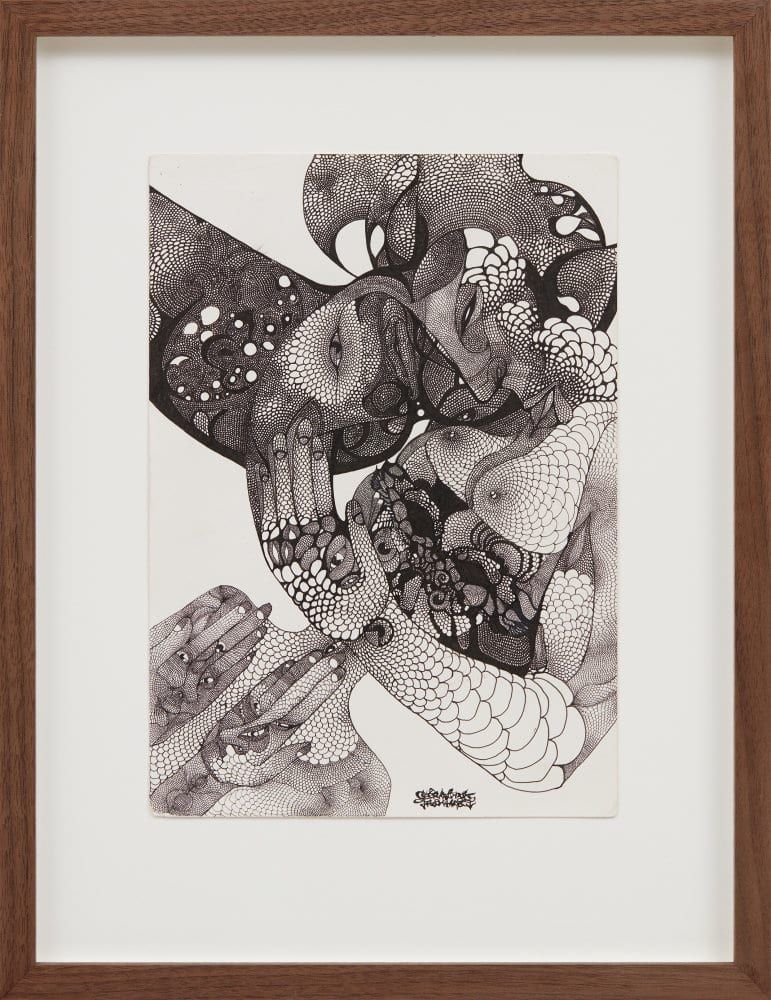Carolina Falkholt
Highlighting the systematic nature of the seemingly chaotic
, 2013Carolina Blue Falkholt is a, slightly controversial, Swedish contemporary artist, musician, and poet, best known for her, often, monumental grafitti murals, causing debate about art in public spaces. One recent, and much discussed, example is the 2018 mural (covering five storeys of an apartment block on Kronobergsvägen in the Kungsholmen district of Stockholm) Fuck the World, depicting a huge erect blue penis, which astounded onlookers before being overpainted after a week of protests and public indignation.
Falkholt motivates her often sexually provocative art with the need for counter-images that can spark discussions about gender identity. She wants art that addresses women’s bodies, sexuality, and genitals in a new way, as opposed to how ‘the female body is a creature depicted in museums that is only meant to be enjoyed.’ She, thus, creates her provocative images as a direct result of being provoked herself by the way society works. Among other things, she also wants to encourage debate about how society deals with the issues of prostitution and pornography, wanting women to reclaim power over their bodies.
Falkholt accordingly considers her images to be a means of ‘decolonising’ the female body. In this respect Falkholt regards American experimental visual artist Carolee Schneemann (1939–2019, alongside Yves Klein, Yayoi Kusama and Yoko Ono, one of the pioneers of performance art, who often attracted considerable attention, not least because of her groundbreaking approach to physicality, nudity and sexuality) as her mentor. Falkholt’s rendering of aesthetically appealing female bodies covered in fish scales (which have often been interpreted as fishnet stockings) has however sometimes led to criticism accusing her of actually contributing to the sexualisation of public space. Some also view her art as pornographic, whereas Falkholt argues that she wants to reclaim the female gender from ‘a male gaze damaged by pornography’. She believes that it is important for art to provoke a reaction, regardless of the manner in which it does so, where the provocation, however, is merely a means to an end. Asked by Pontus Silfverstolpe, in an interview conducted in connection with her 2021 CFHILL exhibition Du får dansa i min park (‘Frukost med Carolina Falkholt - “Jag ser konst som medicin för samhället”’, Barneby’s Magazine, 25 August 2021), whether Falkholt considered provocation to be an important part of her artistic practice, she, thus, answered:
No, even though I understand that some of my works contain provocation, it is not the provocation itself that is important, but rather another driving force: that it should rub where it needs to rub. I see art as medicine for society. I think that art has power in society because it contains the most extreme and up-to-date poetry that exists at any given time. Artists always take things further. They have nothing to lose. Being an artist means shaping the present.
Firestorm Foundation acquired Lyfta fram det systematiska i det skenbart kaotiska (Highlighting the systematic nature of the seemingly chaotic) at Falkholt’s exhibition Du får dansa i min park (You Can Dance In My Park). In addition to brand new art, multimedia artist Falkholt had also, especially for the exhibition, composed music and written poetry. Based on the gallery context, her monumental murals, graffiti and street art this time took a back seat in favour of a new practice where painting and drawing, on a more intimate scale, took centre stage. Her unmistakable intensity remained, however, this time in the form of dense psychological landscapes and complex relationships, coming to life on canvas or paper. This shift in Falkholt’s artistic practice, was touched upon in the gallery’s press release ahead of the opening:
She is now transferring her creativity and emotional register into a more lyrical and concentrated artistic practice, where memory, introspection, music production, poetry and opera have taken over her time. In the exhibition at CFHILL, the audience can enjoy her newly produced works on canvas and drawings, executed in a style unique to her that combines the intuitive intensity of graffiti with a more subtle and thoughtful approach.
How Falkholt’s new approach to painting had generated pictures characterised by lyrical qualities was also noted in the exhibition catalogue, where Paulina Sokolow wrote (‘Introduction to Carolina Falkholt, Du får dansa i min park’, 27 August 2021):
The isolation of the studio, and the inherent slowness and intimacy of paper, as opposed to the public, large spaces that spray paint demands, have brought out new dimensions of Carolina Falkholt’s art. Thoughtful, lyrical mental webs, working their way through the fibres, bit by bit, like some pedantic geographer methodically charting unknown lands, or a shaman’s repetitive, ritual use of symbols for communicating with the voices of spirits. A belly button, a hand, transitions into a continent, the coastline thinning to a veil, almost disappearing into the white. Other sections form opaque land masses made of feathers, glistening church windows, and rough scales. […] Encountering this artist is, ultimately, to encounter the fundamental terms of art. All or nothing. And, coupled with that, a readiness to venture into uncharted territories.
Lyfta fram det systematiska i det skenbart kaotiska
(Highlighting the systematic nature of the seemingly chaotic)
Signed Carolina Falkholt.
Provenance
CFHILL, Stockholm, Du får dansa i min park, 27 August-2 October 2021.
Firestorm Foundation (acquired at the above).
Copyright Firestorm Foundation
